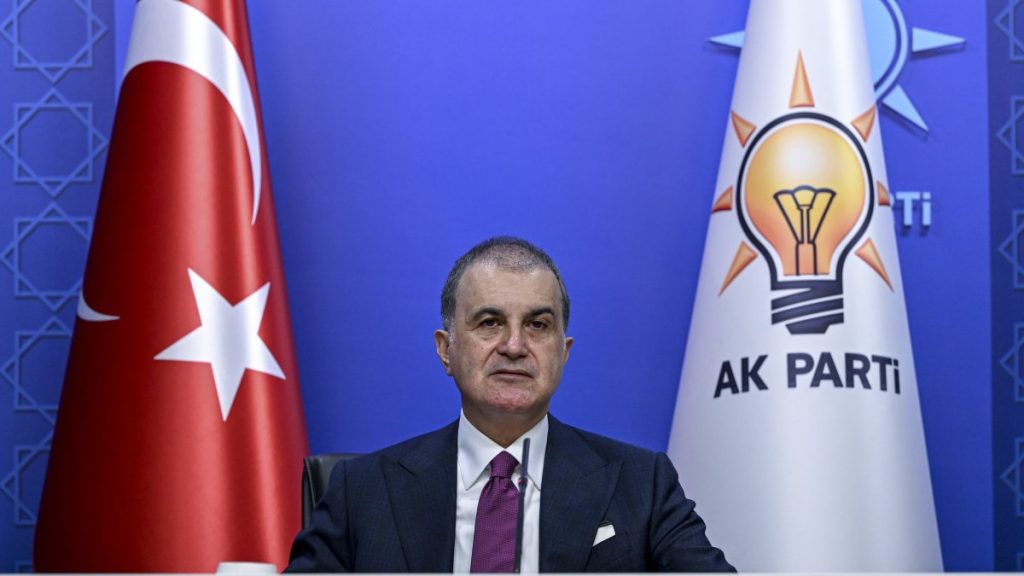There may be new developments regarding the dissolution of the PKK terrorist group this month, the spokesman of the ruling Justice and Development Party (AK Party) said Monday.
Speaking to reporters in a news conference at the party headquarters in the capital Ankara, Ömer Çelik said the dissolution of the PKK terrorist group and its disarmament will mark a turning point. He noted that the delegation of the Peoples’ Equality and Democracy Party (DEM Party) has been working in this regard.
Speaking amid ongoing regional tensions, Çelik stressed that deepening Türkiye’s internal social cohesion and expanding its democratic capacity are more crucial than ever, particularly in the face of global instability.
“The current climate shows how valuable it is to strengthen our national unity and stand in solidarity with the peoples of our region and neighboring communities,” he said.
Çelik warned that numerous actors in the region aim to spread chaos and bloodshed to serve their own interests through “divisive scenarios.” He pointed to efforts to sow discord between ethnic and sectarian groups.
He underscored Türkiye’s consistent position of brotherhood and solidarity with all peoples in the region, including Turkmens, Arabs, Kurds, Sunnis, Shiites, Alawites, Jews, and Yazidis, rejecting all forms of ethnic or sectarian division.
“Türkiye has both the state capacity and political experience to confront these threats,” Çelik said. “We’ve stood firm against those seeking to bring catastrophe to the region’s peoples.”
Highlighting Türkiye’s goal of eradicating terrorism entirely, Çelik emphasized that a “terror-free Türkiye” is essential for securing the nation’s future. “We must ensure that terrorism no longer casts a shadow over our destiny,” he added.
Çelik said the government will continue to strengthen Türkiye’s resilience and expand its influence in foreign policy, stressing the need to build a more robust “immune system” across all sectors.
Speaking on Türkiye’s strategic position amid global instability, Çelik said, “God willing, with upcoming developments, we will witness a ‘terror-free Türkiye’ emerge at the right time – a transformation that will contribute to our citizens’ shared future and reinforce solidarity among regional communities.”
He pointed to a range of global crises that have created an increasingly fragile environment, including the ongoing war between Russia and Ukraine to the north, continued instability in Syria and Lebanon to the south, and the deepening humanitarian disaster caused by the Israeli government’s genocidal attacks in Gaza under Prime Minister Netanyahu.
“In Gaza, we are witnessing a worsening genocide,” Çelik said, also referring to U.S. economic protectionism under President Donald Trump as part of the shifting global order. “All definitions and power balances are being redefined.”
Despite the chaos, he emphasized that Türkiye remains at the center of this evolving geopolitical landscape. “Our greatest strength is the unity and cohesion of our citizens – along with the strength of our democracy, our republic, and the relationships we’ve built with the peoples of our region,” he said.
PKK leader Abdullah Öcalan in late February called on his group to lay down arms and dissolve in what would mark the end of more than four decades of the PKK’s campaign of terrorism targeting Türkiye. A previous peace process collapsed in 2015, sparking a resurgence of violence.
The terror-free Türkiye initiative was launched last year by Devlet Bahçeli, a government ally. The DEM Party served as a messenger for Öcalan in talks aimed at realizing the initiative. The PKK is expected to hold a “congress” this spring to announce its full compliance with Öcalan’s call.
However, the terrorist group has set conditions, including Öcalan’s release.
Ankara has so far rejected the demands, including the unilateral cease-fire announced by the group.
In its 40-year terror campaign against Türkiye, the PKK, listed as a terrorist organization by Türkiye, the United States and the European Union, has been responsible for the deaths of over 40,000 people, including women, children, infants and the elderly.


